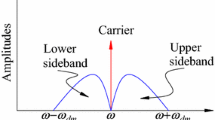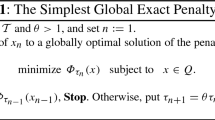Abstract
An approach to improve the accuracy of the incremental solutions to a nonlinear problem, through a strategy to control the size of the increment, based on stationary of an argumented energy functional, is presented. The problem of control of an optimum step size in the incremental theory is formulated for a fixed number of increments. The variables in this argumented functional are: (i) the incremental displacement vector, (ii) the scalar parameters λ i which characterize the size of each of the increments, i = 1,..., N, and (iii) a Lagrange multiplier μ which enforces the constraint that the sum of all the normalized increments, i. e., Σλi is equal to 1. The optimality condition provides us a rigorous approach which gives rise to an iterative procedure because of nonlinearity of the stationary condition. If the number of increments is not prescribed, a noniterative procedure can be obtained, where the incremental sequence is controlled adaptively with less computational effort. The extension of the proposed method to non-selfadjoint problems, where a potential energy function does not exist, is also discussed. Numerical examples demonstrate the remarkable improvement in the accuracy of the solution by optimizing the incremental sequence, as well as the effectiveness of the adaptive control procedure proposed.
Similar content being viewed by others
References
Bergan, P.G.; Soreide, T.H. (1973): A comparative study of different numerical solution techniques as applied to a nonlinear structural problem. Comp. Meth. Appl. Mech. Eng. 2, 185–201
Bergan, P.G.; Horrigmoe, G.; Krakeland, B.; Soreide, T.H. (1978): Solution techniques for non-linear finite element problems. Int. J. Numer. Meth. Eng. 12, 1677–1696
Bergan, P.G.; Holand, I.; Soreide, T.H. (1979): Use of the current stiffness parameter in solution of nonlinear problems. In: Glowinski, R.; Rodin, E.Y.; Zienkiewicz, O.C. (Eds.) Energy method in finite element analysis, pp 265–282. Chichester: Wiley
Carroll, W.E. (1978): On the reformulation of the finite element method. Comp. Struct. 8, 547–552
Crisfield, M.A. (1981): A fast incremental/iterative solution procedure that handles ‘snap-through’. Comp. Struct, 13, 55–62
Krieg, R.D.; Krieg, D.B. (1977): Accuracies of numerical solution methods for the elastic-perfectly plastic method. Trans. ASME, J. Pressure Vessel Tech. 99, 510–515
McNeice, G.M.; Marcal, P. V. (1973): Optimization of finite element grids based on minimum potential energy. Trans. ASME, J. Eng. Industry 90, 168–190
Pedersen, P. (1973): Some properties of linear strain triangles and optimal finite element methods. Int. J. Numer. Meth. Eng. 7, 415–429
Prager, W. (1975): A note on the optimal finite element grids. Comp. Meth. Appl. Mech. Eng. 6, 363–366
Riks, E. (1979): An incremental approach to the solution of snapping and buckling problems. Int. J. Solids Struct. 15, 529–551
Schmidt, W.F. (1978): Adaptive step size selection for use with the continuation method. Int. J. Numer. Meth. Eng. 12, 677–694
Seguchi, Y.; Tanaka, M.; Tomita, Y. (1981): Optimal finite element discretization—A dynamic programming approach. Proc. Int. Symp. Optimum Structural Design, Univ. Arizona, Tucson, Arizona, USA, pp 13/13–13/19
Shephard, M.S.; Gallagher, R.H. Eds. (1979): Finite element grid optimization. New York: ASME
Sinha, D.K.; Hsu, T.R. (1983): On the optimum load step size selection scheme for nonlinear finite element stress analysis. Comp. Struct. 17, 149–155
Siu, D.; Turche, D. (1981): Optimal finite element discretization for nonlinear constitutive relations. Comp. Struct. 13, 83–87
Thomas, G.R. (1973): A variable step size incremental procedure. Int. J. Numer. Meth. Eng. 17, 563–566
Tracy, D.M.; Freese, C.E. (1981): Adaptive load incrementation in elastic-plastic finite element analysis. Comp. Struct. 13, 45–53
Author information
Authors and Affiliations
Additional information
Communicated by G. Yagawa, December 18, 1985
Rights and permissions
About this article
Cite this article
Tanaka, M., Seguchi, Y. Optimum/adaptive incremental sequence in nonlinear analysis. Computational Mechanics 1, 243–257 (1986). https://doi.org/10.1007/BF00273701
Issue Date:
DOI: https://doi.org/10.1007/BF00273701




